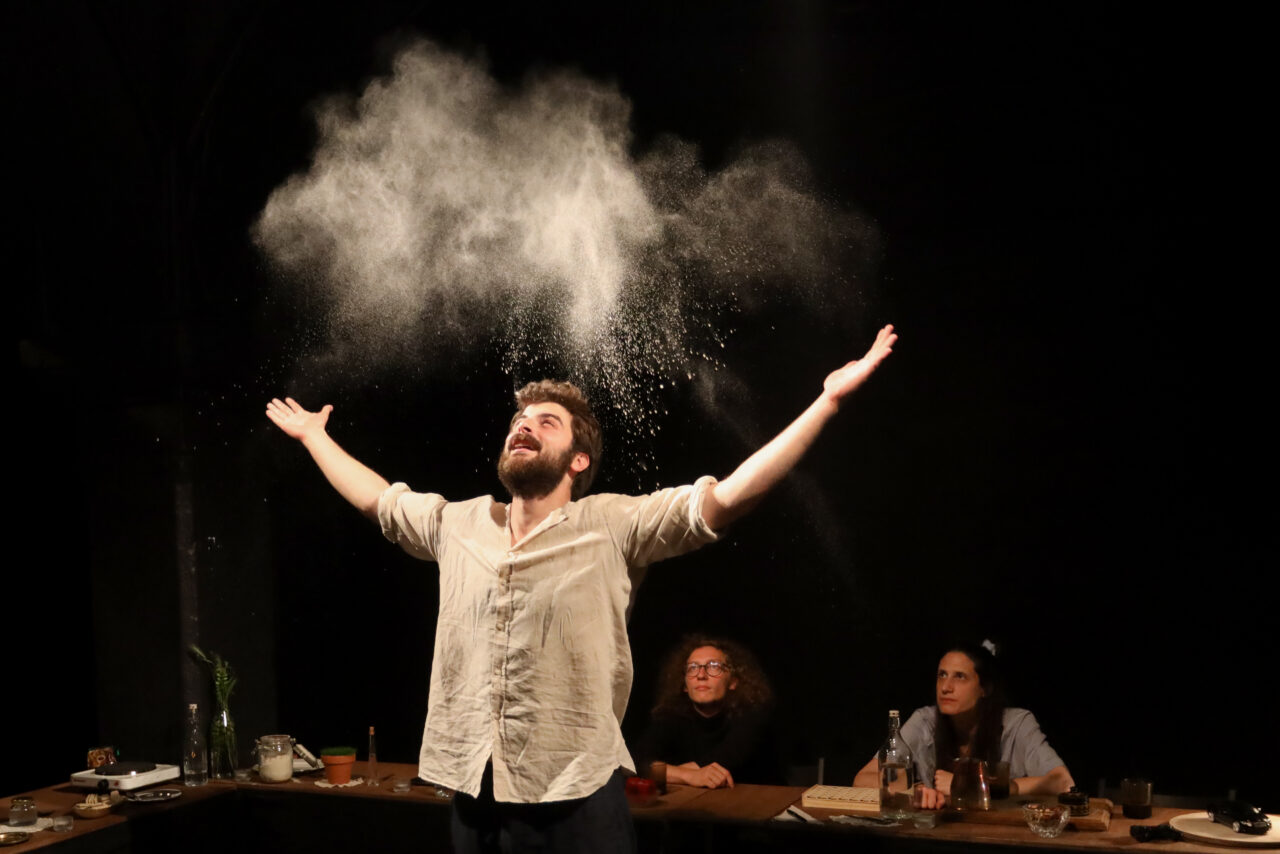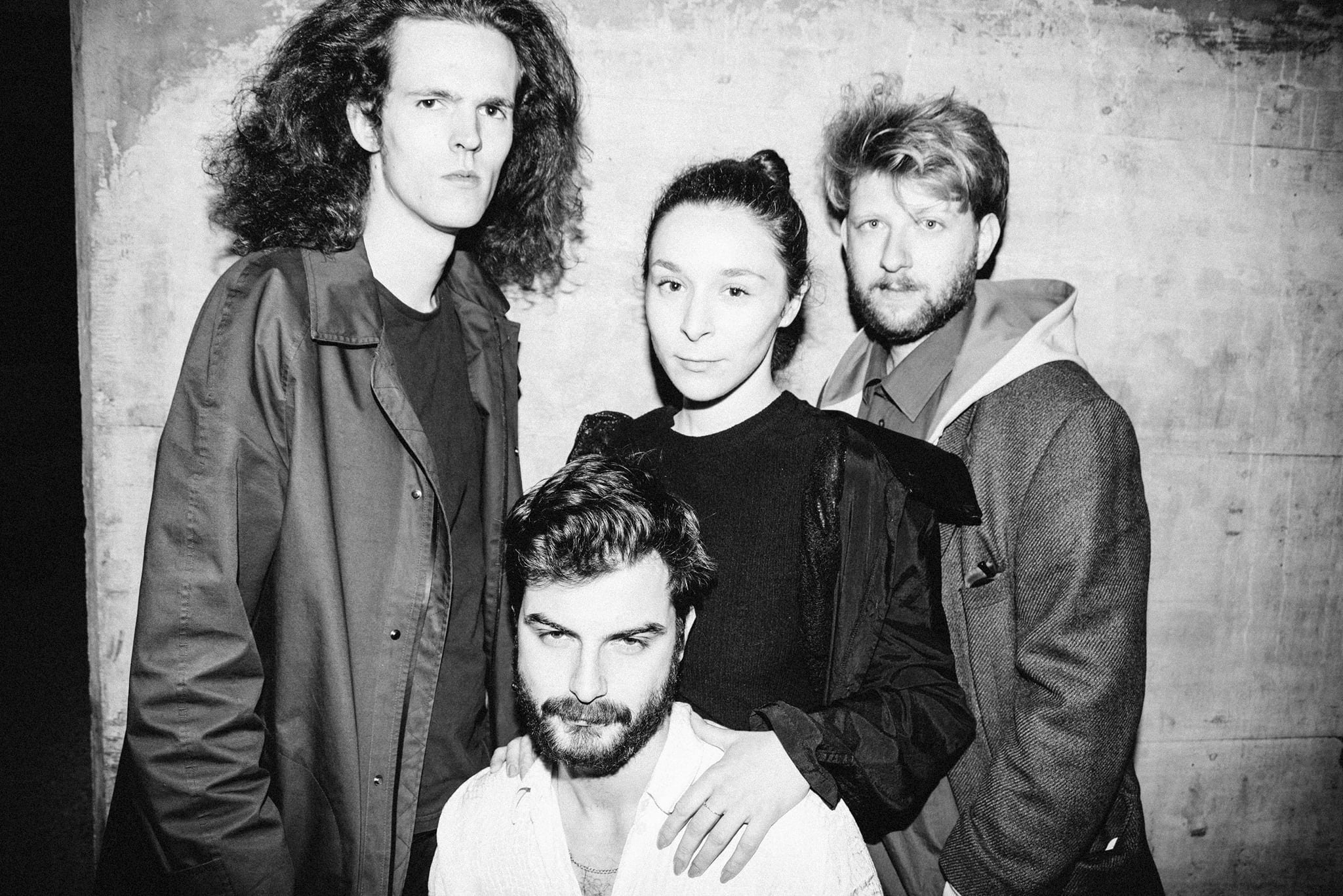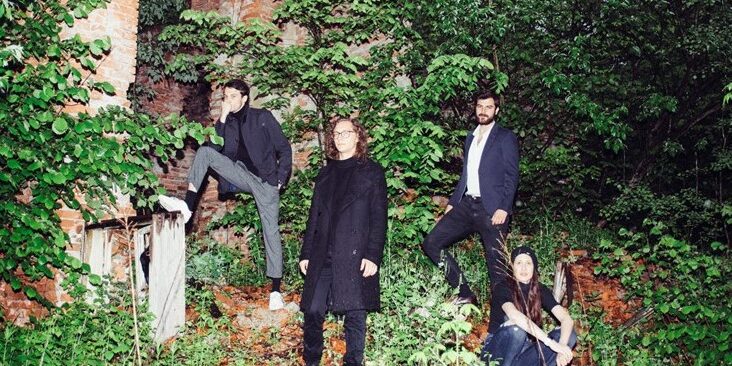Počemučka is a theatre collective with an interest in community and new ways of making work. They speak to Živa Kadunc about their innovative approach to theatre and their place in the Slovenian theatre scene.
The creators and founders of the Počemučka collective (Aljoša Lovrić Krapež, Domen Novak, Filip Mramor and Klemen Kovačič) began to collaborate in 2019. They met during their studies and discovered that their ideas about theatre were similar. Their first staged work took place at the Academy of Theatre, Film, Radio and Television, and was titled Piano and Screaming (2019). They made their name with Under Construction (2021), produced by Glej Theatre.
Their innovative approach and their interest in what makes community a community, especially in these individualistic times, has resulted in work that is dynamic, experimental, yet coherent and witty. Their performances make us subtly wonder about dichotomy between the individual and the communal and their work makes for a fresh and intriguing addition to the Slovenian scene.
Živa Kadunc: Why did you decide to form a collective?
Domen Novak: Aljoša first invited the rest of us (at the time there wasn’t a collective yet) to create something that we weren’t used to making in the study process at the time – work that moved away from dramatic text and focusing on movement. Aljoša took a rather laboratory approach. We didn’t start because of our desire to make an actual performance. We were more interested in how we can (co)work together and the process of creation itself. At some point, however, we realised we needed an audience, so we also invited our study mentors, and decided to go through with our (final) product as a performance. This was the moment we formed and committed ourselves as a collective – for us, an extremely important moment.
Aljoša Lovrić Krapež: In the second year of undergraduate studies: Domen, Filip and Klemen studied stage acting and I studied dramaturgy. We all felt the need to gather our common experiences, to [create something] almost punk-like. We wanted to test the knowledge we’d acquired, find different methods, other codes of the established theatre hierarchy – we wanted to redefine terms.
With Piano and Screaming we basically weren’t interested in any outside content – we were the topic, the theatre was the topic: what is acting, how to perform roles in theatre? We conceived and thought in simpler terms. With [our second show] Under Construction, when our name had already caught on and we’d been considered a collective, we started thinking about other things.
Živa Kadunc: What are the origins of your name, Počemučka?
Domen Novak: ‘Počemu’ means why in Russian, and Počemučka is a child who constantly asks why, why, why and wants to know all the answers in this world. In Slovenian we call them ‘zakajček’. It seemed and still seems to correspond to a certain playfulness and the thematic nature of our inquiries and questions we constantly ask ourselves; why and how to do something, how to look at a certain topic.
Živa Kadunc: In between Piano and Screaming and Under Construction, the pandemic stopped you for a while, but I’d imagine the process of making the show- given that you were building work from the ground up – wouldn’t have been any shorter in any case, as you were creating work outside of the framework of an idea already developed
Domen Novak: Corona absolutely bamboozled us in respect of Under Construction. First of all, we had the intention of a time-shared process, but the first part of it, aimed at preparing the concept, was severely cut back. There was no more time to test concrete ideas. Due to the pandemic-induced delays in the institutional sphere of theatre, in which some of us were working at the time, Počemučka’s work was delayed. The pandemic had an incredible impact during [our work] and on our work and on the final product. We also had to adapt in terms of content, in the last two weeks before the premiere of Under Construction we only had one rehearsal at which all of us were present, so we had to make a lot of substantive and formal decisions without the time which we would’ve needed even in ideal conditions.

Under Construction Photo: Ivian Kan Mujezinovic
Živa Kadunc: In Under Construction you devoted more attention to movement.
Aljoša Lovrić Krapež: Movement was the most neglected – due to the pandemic circumstances – of all the elements we wanted to explore in our work. The [imaginary] city that we chose for inspiration, the centre of everything, was supposed to lead a reflection on the collectivity of ‘citizens’ in as many different ways as possible – movement being one of them.
For me, this was a planned aspect [of our work] as well as a substantive stimulus. We researched movement less than we would have liked to, but still, the easiest way for us to delve into it was in [movement’s] relationship to objectivity. In the scenographic elements, it had some kind of substantive input, but in the final production, as I’ve said, it was neglected. I hope in the future we can dedicate ourselves to it and develop [this aspect of our work] more.
Živa Kadunc: Despite you being dispersed around the world and working on separate projects, can we expect to see more Počemučka productions?
Domen Novak: Absolutely. We are creating a new project, a new show. It is planned for the 2024/25 season. We are in preparation, in the initial phase of development.. We designed a project where we focus intensively on movement, object theatre and music. We want to move away from the storytelling principle for a while.
Aljoša Lovrić Krapež: A lot is changing, our interests – individually and, consequently, as a collective – are quite different from what they were during the Under Construction process. We want to work in more horizontal structure to the basic way of working in theatre and to work more democratically. This requires longer processes, especially if we are really going to move to the concept of collective creating. Before this larger project we are planning a couple of smaller ones, possibly in a different form.
Živa Kadunc: How do you see your role in Slovenia? As a relatively fresh entity, you have a large number of innovative ideas but can this very freshness also be puzzling to people?
Domen Novak: With the formation of this collective we established ourselves to some extent in Slovenia, where there aren’t many collectives, except for Beton Ltd. Glej Theatre has enabled us to stage Under Construction frequently, and we are still replaying it there. We’ve also received a special prize from the jury at the Slovenian Drama Week for this production, which provided concrete support and encouragement for Počemučka.
Luckily for us, the Slovenian scene is interested in us, I would attribute our low number of productions (two so far) more to our being dispersed and, of course, the complexity of the [creative] processes and the study in which we are all still involved. The scarce resources of the Slovenian cultural scene didn’t affect us excessively. Bunker awarded us financial support with partial earnings from the FORSALE project, where they marketed their show Ich kann nicht anders, and they invited us to a residency, where we started the process of our next project. So we are grateful for that.
Aljoša Lovrić Krapež: It’s true that our processes take a lot of time/ it took us a year and a half to make Under Construction. The horizontal principle of collective work is new for us. We need a lot of time for developing relationships and material, which makes the process strenuous, yet it is what makes us – us. The collective demands constant redefining and recontextualising. Bunker’s invitation for the residency and Glej Theatre’s immense support means a lot to us – such support is instrumental to our subsistence and development.

Počemučka. Photo: Ivian Kan Mujezinovic
Živa Kadunc: And in the future can we expect collaborations outside the Počemučka collective?
Aljoša Lovrić Krapež: That’s right. They’re inviting us and we’re inviting people whom the projects require and with whom we share interests – the creators who intrigue us. The director, for example, no longer exists in the classical sense of the word, the process of the next project will be a good litmus test of how this works. That’s our current interest. This is why the dynamics [of the collective] will change a lot, or have changed already. A key part of the experiment is the flow of relationships among everyone involved in the process. This does, however, create differences between us, but of course, this can be an additional stimulus for conceptual creativity.
Živa Kadunc: And what does Počemučka mean to you, the creators, personally?
Aljoša Lovrić Krapež: The creation of an artistic collective leads to communication problems precisely because of the equality of work, which requires at least the hearing out, if not the considering, of every opinion. So a lot of adapting [is required], but also responsibility and trust, which also come with collectivity.
For me personally, it releases this valve of curiosity that connects us all; the curiosity – hidden even in our name – and the inspiration of other perspectives. This collective is developing in search of something new (not necessarily novelty or discovery, more novelty in the sense of creating a free and creative space), perhaps its own expression.
Domen Novak: Our initially informal (co)operation has only lasted for about five years – but during this time, as in any relationship, we really got to know each other. We discovered a lot about each other, which can sometimes be an extreme advantage and other times a hindrance. But we’ve been living with each other for five years – in different forms – and we’ve developed our own way of communication; we know each other’s strengths and weaknesses. Compared to the rest of what I do, this seems incomparable; you always enter the field of the authorial, personal and free which enables the questioning of conventions in terms of roles in theatre. Počemučka allows for incredible breadth in this respect.
Aljoša Lovrić Krapež: We always try to redefine and permutate our methods of creating. Our work in the theatre enables new opportunities and possibilities in terms of the material, and then questions it. We conceive of the theatre as the process of wider ethics as well, and we align our methodology to that, to the idea of the theatre performance as a magical co-creative process of the collective imaginarium.
Further reading: Mladi Levi Festival: independent, international, optimistic
Živa Kadunc is a critic of contemporary performance art and a speaker on Radio Študent (Slovenia). She loves her plants.








